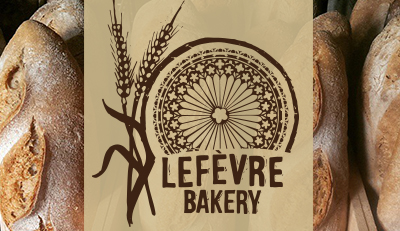A Farewell with Love and Gratitude
In the summer of 2013, my dear friend, Bethany, nonchalantly asked me,
“Lisa, would you be interested in baking bread for a living?”
Despite knowing me and my interests quite well, I think she was still surprised when I paused and hesitantly answered, “I just might be.”
What Bethany did not yet know was how seriously I was exploring my life’s next move. In this exploration I had began to fully embrace the long-hovering truth about how I am wired—that in order to be fully myself and fully present in the world, I needed to be spending more time creating with my hands than my current lifestyle allowed. And so my journey as a baker began.
I quickly arranged to shadow the former baker at McBurney Manor (location of LeFevre Bakery from 2014 – 2015) and realized that baking was even more fulfilling than I had hoped. These short lessons were followed by the best education possible—experimenting on my own and starting/operating a bakery. My comfort with dough and my interest in the world of bread grew. I began to realize that the product I was making in 2014 did not match the standards and qualifications of the great breads I was reading about in my books and online. This led me to apprentice Gerard Rubaud in Westford, VT over the winter of 2015. Through Gerard and by working with 500-750 loaves a week, I started to learn old French baking techniques. My interest in baking authentic sourdough grew and I became fully invested in knowing and baking the best bread I could for the Huntingdon and State College communities.
I’m reflecting on the beginning of my role as a professional baker because LeFevre Bakery is in for its first big move! In January 2016, I am moving to Thetford, Vermont to be close to my fiancée, Mark (wedding in May 2016!), and taking LeFevre Bakery with me.
Mark did not propose at the bakery, but he did carve this ring out of a piece of black walnut that would have been used as kindling for firing the oven. A mid-bake shot was a must!
I will be forever grateful to the Huntingdon community who supported my venture with gusto from the start, bought into the heart of my bakery, and graciously accepted my failed experiments and recipe changes as I carved out a small spot for myself and good bread in central PA. Any business, no matter how small, is a huge undertaking, and I am deeply indebted to my friends, customers who became friends, and supporters over the last two years!
Until Mark and I are able to build a wood-fired oven, LeFevre Bakery will be operating on a small scale for friends. Our hope is to bring LeFevre Bakery bread to the Upper Connecticut Valley of Vermont and New Hampshire as soon as possible.
All the best to you and if you’re in Vermont, be sure to drop me a line at lefevrebakery@gmail.com!
With love,
Lisa


